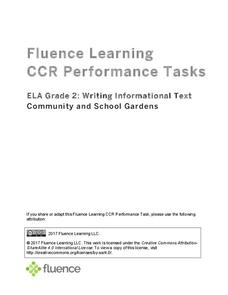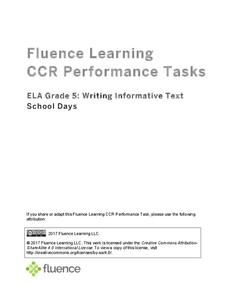Curriculum Corner
Informational Text Graphic Organizers
Scholars delve into an informational text with the help of four pages that focus on the author's purpose, vocabulary words, summarization, and main idea.
Curriculum Corner
Informational Text Graphic Organizers
Examine informational text with a three-page worksheet that focuses on taking notes, identifying the main idea, and locating supporting details in order to form a summary paragraph.
Curriculum Corner
Informational Text Graphic Organizers
Accompany informational text reading—independent or whole class—with a worksheet that challenges scholars to examine the text's main idea, details, take notes, and record vocabulary words and their meanings.
E Reading Worksheets
Summarizing Text
Help learners find the most important information in a text with a lesson on summarizing. As kids read through a passage about Johannes Gutenberg, they summarize small excerpts, put events in sequential order, and respond to two longer...
Fluence Learning
Writing Informational Text: Community and School Gardens
Two informational texts feature community gardens of the past and present and how seeds grow. Scholars read, discuss what they have read, complete a timeline, define words, and compose a brief essay about the texts' main idea.
Fluence Learning
Writing About Informational Text: Everybody Can Bike
A three-part assessment challenges scholars to read informational texts in order to complete three tasks. Following a brief reading, class members take part in grand conversations, complete charts, and work in small groups to research...
Fluence Learning
Writing About Informational Text: Beyond the Beyond—Galaxies
Everyone has a different point of view, even when it comes to the enormity of the universe. Two separate text passages explain the scope of a galaxy, prompting young readers to write an essay about each author's argument and how the...
Nancy N. Boyles
Summary Frame for Story Text and Informational Text
Provide these templates as aids for pupils as they work to compose summaries of both stories and informational texts. The first two frames provide sentence starters to help learners structure their summaries and include all the necessary...
Fluence Learning
Writing Informative Text: Did Shakespeare Write Shakespeare?
William Shakespeare penned some of the richest and most fascinating works of literature—or did he? Middle schoolers read three brief informative passages and conduct additional research to evaluate the claim that Shakespeare did not...
Curated OER
Main Idea in Informational Text
Readers identify main ideas and supporting details using informational texts. For this literacy lesson, they make predictions and read the text to find the main ideas. They use a table diagram to define the main idea and supporting...
Curated OER
Main Idea in Informational Text
Individuals complete a pre-assessment to gauge their ability to determine the main idea and supporting details in nonfiction text. They examine a new piece of nonfiction reading by looking at the table of contents, headings, and index...
Fluence Learning
Writing Informative Text: School Days
A three-part writing assessment challenges scholars to think critically about schools of the past and present. Learners read informative texts, answer questions to prepare for a discussion, research in small groups, complete a Venn...
Great Schools
Different Types of Writing
What type of writing is this? Learners read a brief introduction to various types of text: instructions, explanations, poems, folk tales, novels, informative, and arguments. The introduction doesn't explain these, so...
EngageNY
End of Unit Assessment: On-Demand Informational Paragraph About How the Poison Dart Frog Survives
A final assessment marks the end of a unit that takes a close look at a variety of informational texts all about frogs. A graphic organizer aides scholars in planning an accordion paragraph using their recorder forms from previous...
Curated OER
Readings in Hudson River Natural History
Reading and understanding informational text is a key element to understanding every discipline. Elementary learners read three different articles focused on various animals and habitats in the Hudson River. They answer comprehension...
Houghton Mifflin Harcourt
Alexander Graham Bell
Study the features of nonfiction text with a set of comprehension and analysis materials. Readers learn about Alexander Graham Bell with questions about the text, writing prompts, and proofreading activities.
Scholastic
Persausive Writing
A unit on persuasive writing guides elementary learners through the writing process. The first part examines the elements of persuasive writing, including expressing an opinion, connecting ideas, using supporting facts, and writing...
California Education Partners
We Are The Ship
An assessment sheds light on scholars' ability to read, gather evidence, and draft an original written composition. Learners read an informative text twice before taking notes and discussing their thoughts and textual evidence with a...
Curated OER
Only the Facts
Practice the strategy of summarizing to gain meaning and knowledge from an informational text. Young readers highlight supporting details and main ideas, and then they use this to summarize two articles: "The Great Quake" and "What...
Read Works
American Government Preamble to the United States Constitution
Observe Constitution Day with a learning exercise that delves deep into the who, what, why, when, where, and how of the U.S. Constitution. Scholars read a short informational text then answer 10 questions—short answer and multiple...
English Worksheets Land
Blaze a Trail
Compare and contrast different ways that sources present information with a reading worksheet. After readers view two short passages about blazing a trail, they note the information they found in each selection.
K5 Learning
What Police and Detectives Do
What do police and detectives do to keep their community safe? Six short-answer questions make up a worksheet designed to reinforce reading comprehensions skills while providing information about police officers and detectives.
California Education Partners
Seeing Eye to Eye
A performance task challenges scholars to read an informational text then respond with an explanatory essay. The exam begins with an independent reading of Seeing Eye to Eye by Leslie Hall. A second reading follows with the...
California Education Partners
Telescopes
An assessment challenges scholars to read an informative text then respond with an explanatory essay. The exam begins as participants read a text passage twice then take notes, making sure to jot down key details. Following the...























